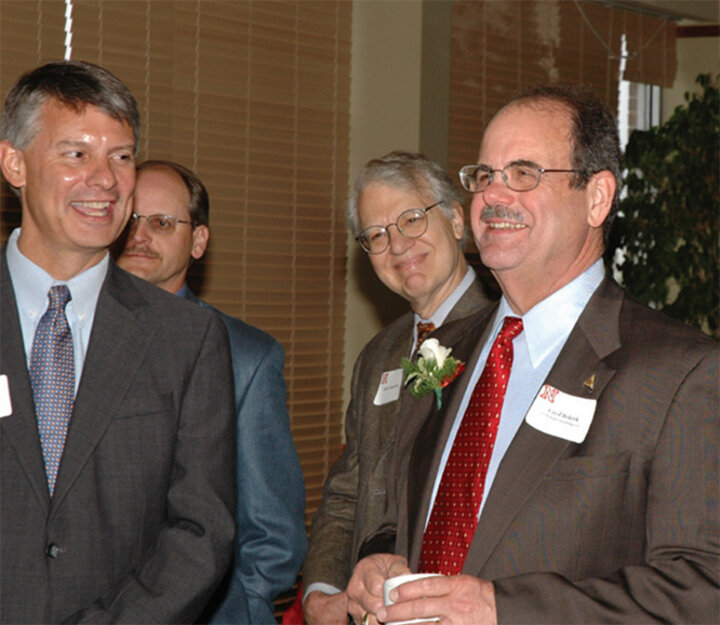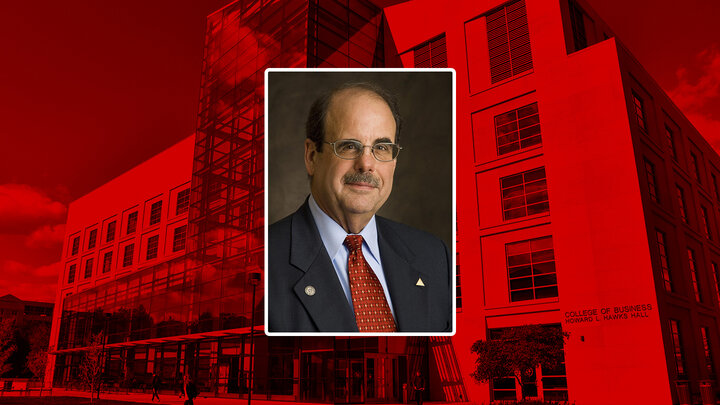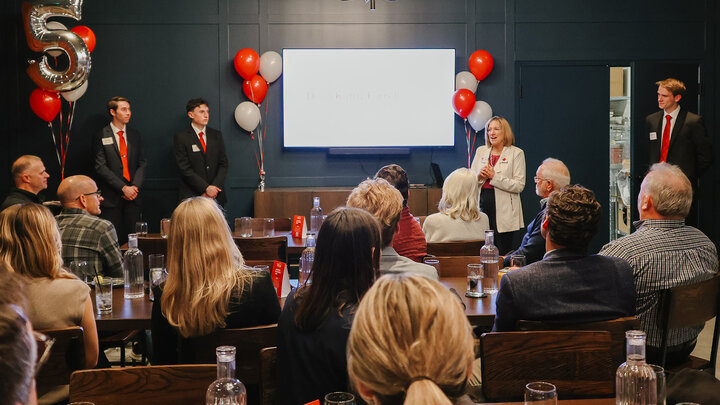Cecil Bykerk, ’68, faced an early impasse in his actuarial career when he left Nebraska for his first job. Instead of a straight line to New York City, he encountered an unexpected sharp turn when drafted into the U.S. Army at the height of the Vietnam War – a turn that eventually gave him tools to bring back to his home state and help build a world-class actuarial science program.
“After getting my master’s in mathematics at the University of Nebraska–Lincoln, I got a job offer from New York Life Insurance,” said Bykerk, who discovered the actuarial profession in a Life magazine ad he saw in the grocery store of his hometown in Columbus, Nebraska. “I talked to my draft board first because it made no sense to move to New York City and then immediately get drafted, but they calculated things and told me not to worry. ‘You’re good,’ they said. So I moved to New York and two weeks later got my draft notice.”
The Army sent Bykerk packing to Fort Lewis, Washington, where he believes his late night studying as a graduate student helped prepare him for the lack of sleep in basic training, which included a battery of academic tests.
“At that point everyone was being sent to Vietnam but my orders never came through. I was held over five weeks and my commanding officer asked me, ‘Who do you know?’ Then I found out I had done so well on the math exams I was assigned to a science and engineering job as a computer programmer in the Bonneville Salt Flats. I did statistical programming for research projects,” he said.
Bykerk advanced in responsibilities when superiors discovered he was the only one in his area with COBOL programming experience. He rewrote the entire basic accounting system during the remainder of his two-year tour of duty.
“I got an incredible education learning new things while working with IBM engineers on their latest computers,” Bykerk said. “I learned Job Control Language and organized audit trails – all these things I’d never done before. I also studied for actuarial exams. I had completed only one exam going into the military but came out completing six, only four away from becoming an actuarial fellow.”
A few years after discharging from the military and working in the actuarial industry, Bykerk happened to be back in Nebraska when he learned Steve Kellison, the director of the university’s Actuarial Science Program was looking to hire a new faculty member. Bykerk’s combination of academic and professional excellence impressed Kellison enough to earn the job. Within a year, Kellison stepped down and Bykerk took over the program.
“Steve built actuarial science into a well-recognized program at Nebraska but his approach was more traditional in teaching to pass exams. My idea was to teach students what they needed to know to be a good actuary. I wanted to convert the program to prepare students for the profession. Between me and Warren Luckner (who became director when Bykerk stepped down), we developed a pre-professional focus for students to grow into their careers,” he said.
Luckner credits Bykerk with taking the program to an elite level that eventually became known throughout the world as a Center for Actuarial Excellence by the Society of Actuaries. Despite Bykerk’s relatively short tenure as director, he stayed involved the next 40 years working to make sure the program had proper support through volunteering his time.
“Cecil was on the chair committee,which later became the advisory board, and has been the most generous person financially and in terms of his time commitment to keep things moving forward,” said Luckner. “His impact also extends into the actuarial profession as former president of the Society of Actuaries and the Academy of Actuaries, which are both national associations. The only thing he didn’t lead was the UNL Actuarial Science Club because he was the one who started it.”
According to Luckner, the creation of the Actuarial Science Club became one of Bykerk’s most important contributions at Nebraska.
“When you have a discipline that’s not well known, it’s important to have a club that encourages people to go through shared experiences and bring a sense of community to the program. The Actuarial Science Program at Nebraska is a combination of an academic program and a pre-professional program, and the club is instrumental in getting professional speakers to talk about issues that could be missed in a strictly academic program. Cecil helped students learn what it means to be a professional,” Luckner said.
In recent years, the Actuarial Science Program undertook a campaign to raise funds to assure excellence for years to come. Bykerk kicked off the campaign with a $250,000 donation, which was the culmination of many gifts he contributed through the years.
“Cecil has always been supportive and a huge asset to our program,” said Sue Vagts, director and Ameritas Faculty Fellow of the Actuarial Science Program. “His passion is to ensure we always attract good students, teach the right content and stay connected with the industry. He makes sure companies who benefit from the program are contributing to its growth, and he comes back to talk with our students and refer new students to our program.”
Vagts sees Bykerk as emblematic of his generation. She believes he is a role model for students today.
“Students today might have trouble handling things if their internship is canceled or they have to shift to online learning, but Cecil had to leave his job to help support our country. What a huge impact on his life to finally have the job he worked for and then suddenly find himself drafted,” Vagts said.
Bykerk’s experiences in the military, the actuarial profession and at Nebraska prove a person’s passion can carry them through tough times.
“Actuarial science has given me the opportunity to move up the ladder from where I came,” said Bykerk. “I have a passion for Nebraska’s Actuarial Science Program. I want to continue to give my support. It allowed me an opportunity I could never have imagined when I first saw that actuarial science ad back in high school.”
To learn more about actuarial science at Nebraska, visit: https://business.unl.edu/actuarialscience.





